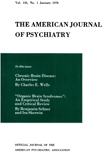AN EXPLANATION FOR TRANSFERENCE CURE: ITS OCCURRENCE IN PSYCHOANALYSIS AND PSYCHOTHERAPY
Abstract
A case report of a "transference cure" is presented in which the mechanisms productive of change were obtained from the patient external to the therapeutic situation. Essentially the patient produced material indicating his analysis of a transference distortion, beyond the awareness of his therapist. No other similar report exists in the literature.
The clinical data is discussed in relation to past conceptions of the "transference cures." It is suggested that certain " transference cures" are the result of the patient's capacity to work through the transference unknown to the therapist, whether in the medium of psychoanalytic psychotherapy or any other approach to psychotherapy.
The significance of the findings in this case are considered in terms of the intellectual capacity of the patient, the influence of the cultural milieu in which it occurred, the precipitating effect of contact between patient and therapist outside the established treatment setting, and the necessity of recognizing that analysis of transference occurs beyond the practice of established psychoanalysis or psychotherapy with psychoanalytic knowledge. The importance of further study of "transference cures" is emphasized.
Access content
To read the fulltext, please use one of the options below to sign in or purchase access.- Personal login
- Institutional Login
- Sign in via OpenAthens
- Register for access
-
Please login/register if you wish to pair your device and check access availability.
Not a subscriber?
PsychiatryOnline subscription options offer access to the DSM-5 library, books, journals, CME, and patient resources. This all-in-one virtual library provides psychiatrists and mental health professionals with key resources for diagnosis, treatment, research, and professional development.
Need more help? PsychiatryOnline Customer Service may be reached by emailing [email protected] or by calling 800-368-5777 (in the U.S.) or 703-907-7322 (outside the U.S.).



